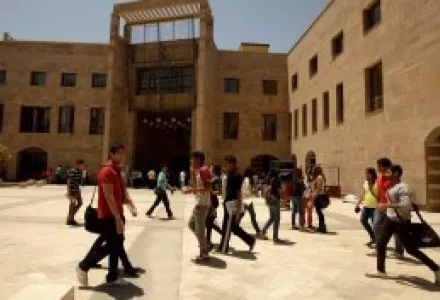A seminar with Professor Lisa Anderson, former president, American University in Cairo. Seventh session of the fall 2016 study group led by MEI Visiting Scholar Professor Robert Springborg, Globalization and Its Discontents in the Middle East and North Africa.
RSVP is required for this session. Click here to RSVP. Please note that an RSVP does not guarantee a seat at the session.
The era of post-Cold War globalization saw the expansion of the influence of US-style and US-sponsored universities and university programs throughout the Middle East and North Africa, from branch campuses to newly-established institutions modelled on US liberal arts colleges to English-sections in national university faculties. This growth also brought many of the contemporary US debates about the purposes, funding and assessment of higher education to the region. As preparation for the public roles of citizenship gave way to neo-liberalism’s training for the labor market of the private sector as the principal rationale for a university education, the liberal arts, particularly the social sciences and humanities, came under increasingly skeptical scrutiny not only in the US but across the Middle East and North Africa.
Lisa Anderson most recently served as President of the American University in Cairo for five years, stepping down on January 1, 2016. Prior to her appointment as President, she was the University’s provost, a position she had assumed in 2008.
As AUC provost, Dr. Anderson presided over the establishment of three new schools and the University’s first PhD programs; as president, she navigated through the most significant political upheavals in the University’s history, serving during the terms of four different Egyptian presidents, all the while ensuring that the academic programs continued to develop.
Dr. Anderson is Dean Emerita of the School of International and Public Affairs at Columbia University, where she led the school from 1997-2007, having been on the Columbia faculty since 1986. Before coming to Columbia, she taught at Harvard University in the Government and Social Studies departments.
Dr. Anderson’s research has included work on state formation in the Middle East and North Africa, regime change in the global south, and social science, academic research and public policy both in the United States and around the world. Among her books are The State and Social Transformation in Tunisia and Libya, 1830-1980, and Pursuing Truth, Exercising Power: Social Science and Public Policy in the Twenty-first Century. Dr. Anderson is a member of the American Academy of Arts and Sciences and the Council on Foreign Relations and served as Chair of the Board of the Social Science Research Council (1998-2008).



